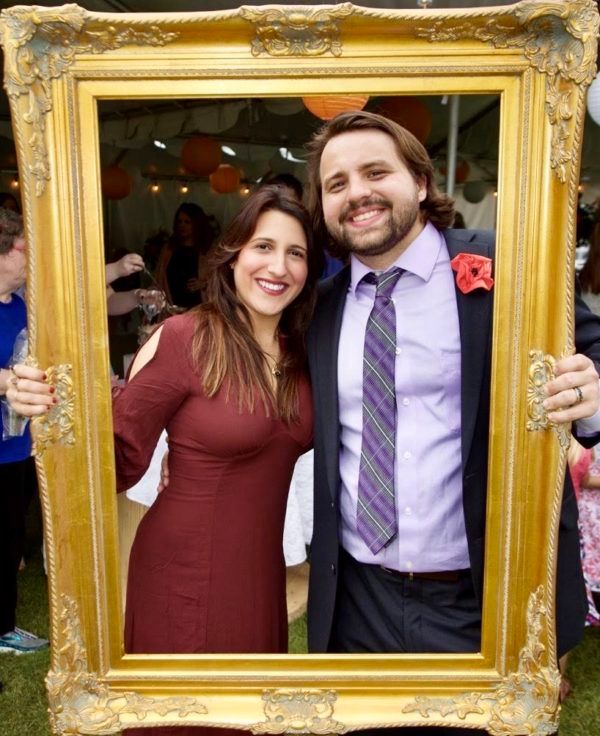
The Many Worlds of Charmed TV Writer Christina Piña
Imagine yourself a self-proclaimed aspiring witch (the good kind), sights dead-set on a professional career in TV writing. Then you land a job on one of television’s most popular hourlong series—a show about witches. Credit the rituals? Divine intervention? Personal ambition and shrewd planning? Christina Piña personifies the struggle of many hopeful writers: breaking from familial expectations, coping with mental health, and finding a clear niche despite coming from “so many worlds.”
Rituals are in Christina Piña’s blood.
From the time she practiced Santeria with her grandmother as a child, to years later, when she became a witch, the 29-year-old has created rituals for many parts of her life.
Including job interviews.
In March of 2019, Christina scored an opportunity to write for the CW reboot of "Charmed," which meant it was time for the the ritual of all rituals. She got up early, made breakfast, picked an outfit, and she was off.
But she didn’t get to CBS Studios a few minutes before her interview—Piña parked at a friend’s house nearby three hours early. She did her makeup exactly how she wanted. Meditated for a half hour to calm her nerves. Prayed. Poured over her notes. Then drove to the CBS lot.
“I walk through the door, I look great, and I’m centered as fuck,” Piña laughed.
“I’m at the assistant’s desk, and Craig Shapiro [co-showrunner] walks out and says, ‘I’m going to the bathroom, but go inside and introduce yourself to Liz [Elizabeth Kruger, co-showrunner],'” Piña said.
“I walked in and sat on the couch, and ... the button on my dress flies off.”
Piña sat there and started to panic. Her chi was thrown. Was her morning ritual all for not?
But this was a moment she’d waited on for years. She wouldn’t allow a button mishap to ruin her chances of working on the show she was born to write.

“I have memories from a very young age of my family opening up pigs and taking their guts out.”
Piña was raised in a large, loud, oftentimes “loony” Cuban household in Miami, Florida. Three generations lived under one roof, including Piña and her two sisters, her parents, and her grandmother.
From an outsider’s perspective: an average family living the American dream. But Piña says behind closed doors was witchcraft, seances, paranormal activity, and the occasional days when grandma became possessed.
“My grandmother’s eyes would roll back into her head, and she would speak in different tongues,” Piña said.
“She would walk out naked like that sometimes, and you’re just trying to hang out with your boyfriend or friends and ... it’s just not a good look,” she said laughing.
Piña’s grandmother was a Santeria priestess. Santeria, a religion combining influences of Caribbean tradition, West Africa’s Yoruba spirituality, and elements of Catholicism, emerged in Cuba during the 17th century. It’s a reasonably complex system. But it blends the idea of divine beings with Catholic saints. People like Piña’s grandmother are said to serve as messengers between the human world and the divine. They are called upon in a variety of methods, including trances, possession, divination, ritual, and sacrifice. Piña’s parents, however, were Catholic and didn’t agree with grandma’s beliefs. They tried to hide it from the world and steer their children far away from that system.
Pig sacrifices and possessed family members can make that difficult.
It was around Christmas 1996. Piña was six. Standing in the driveway of her family’s Miami home with her grandmother, great aunt ... and a dead pig.
“All I remember is my great aunt and grandmother on their knees on the pavement just opening up the pig and pulling stuff out,” Piña said.
“I remember jumping in there and grabbing some of the intestines and my mom seeing and freaking out.”
Blood was seeping down the sidewalk and forming puddles near the street.
“The children were jumping over the puddles and playing!’ Piña laughed.
By the end of the night, the pig was up in flames.
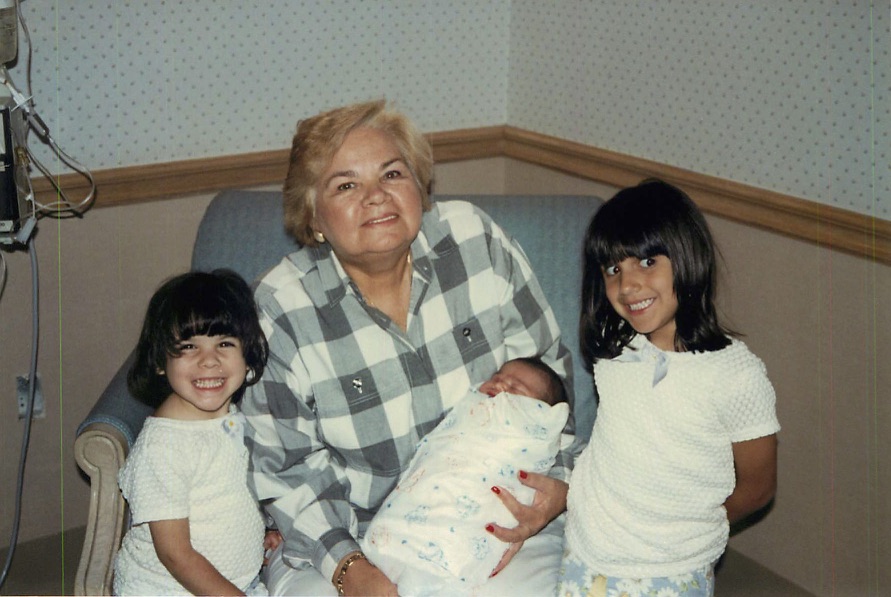
Moments like these influenced how Piña has felt most of her life, as she struggled with her own identity, growing up in what she says were so many different worlds.
“I grew up in an American world, and a Cuban world, a brown world and a white world, and in a world where even my religions were not the same,” Piña said.
A constant battle raged within her. But instead of falling victim, she became independent, argumentative, curious, and precocious. Traits that bled into her teens as she challenged her parents over her education and extracurricular activities.
Eventually, it led Piña down a road that would make her the perfect candidate for her fateful "Charmed" interview.

There’s no other way to say it: Piña was a witch.
Inspired by her grandmother’s Santeria practice, she took up Wicca at the age of 16. The pagan witchcraft is said to have been founded in England in the mid-20th century. Witches take part in rituals, practice magic, and worship deities. Piña enjoyed it—and she was good at hiding it.
That is, until a supposed church friend blew her cover. According to Piña, the friend ratted her out to their pastor in an effort to stop Piña from sleeping with an ex-boyfriend.
“I got in big trouble with the church. My parents got involved, and it was a whole thing, and they were really nervous because they didn’t want anyone to look into our business, especially because my grandmother’s Santeria was a secret.”
Piña couldn’t cast a spell to escape this one. She buried her Ouija board in the backyard, packed her witchcraft memorabilia in a box, and tucked it under her bed. But as the saying goes, you can take the girl out of witchcraft, but you’ll never take the witch out of the girl. (... is that the saying? Close enough.)
Piña was still fascinated by witches, so it’s fitting that her favorite movie was Kiki’s Delivery Service, an anime film about a witch. Her favorite TV show? Charmed, where a group of sisters discover they’re witches.
Piña soon took solace in shows and films. She jumped into theater and acted in school productions. Subsequently, she began directing and writing her own plays.
“At that moment, I realized I caught the bug,” Piña said.
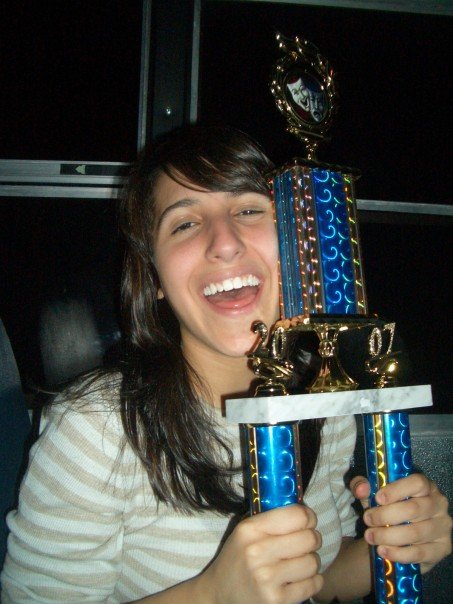
High school became an outlet for Piña’s newfound passion for theater. She wrote plays, mostly about being Hispanic and her family. Much of her writing was done behind her parents’ backs, in fear they wouldn’t understand her newfound interest. She learned the format, she says, by “being thrown into the fire and doing it myself.” After much of her writing was done, she decided to enter competitions. To her surprise, she started winning ...
Her resume is a mile long, full of local and state awards for plays she wrote and directed. But one of her most notable accomplishments came during her sophomore year, where she received second place in the nation at the Scholastics Art and Writing Awards for her one-act play about a character she defines as “a Cuban Nancy Drew.”
It was a defining moment for the 15-year-old Piña, who was then invited to an awards ceremony at Carnegie Hall in New York City. She told her parents, who she says “reluctantly agreed to go with her.”
“While we were there, an agent came up to me and said, ‘I would love to read your work, here’s my business card,'” Piña said. “After he walked away, my dad looked at it, turned around, and ripped it up.”
“He said: ‘I will never let you work in Hollywood.'”

“One Flew Over the Cuckoo’s Nest was the watershed moment for me.”
“That was when I realized movies had the power to invoke catharsis, but to also change minds,” Piña reminisced.
Piña saw the film in her sophomore year drama class with a substitute teacher she described as a ‘film buff.’ During the course, the students were asked to analyze the movie, and the teacher discussed the rising action, climax, and tragedy of the storyline. It was Piña’s first formal educational experience in film, and it caused what she calls an out-of-body experience.
“It had a power I had never felt before that I believe great movies do,” Piña said. “They open your mind and your heart.”
She did everything she could to immerse herself in cinema, including signing up for a film class, enrolling in drama camp after school, and watching as many movies as possible.
Regardless, she didn’t consider any of this a viable career path—she lived in a highly contentious, Republican, immigrant household where she was expected to be a lawyer or a doctor. They needed “one of those in the family,” Piña recalled. But that didn’t stop her from exploring her newfound interest and from truly observing and realizing how influential the arts had been in shaping her identity.
Cartoons, for instance, were the most rudimentary and childlike art form, but she realized how it connected her family across language barriers. And even her father, whom she had a combative relationship with, had an instrumental role in introducing her to classics.
“Once my dad heard of Netflix and how they delivered DVDs to your home, he recommended we get some,” Piña said.
“My dad suggested we start with The Godfather, JFK, and a bunch of others.”
Then a history professor recommended Piña watch The Parallax View and Three Days of the Condor, because of her activism and interest in politics.
“At that point, my mind was totally blown,” Piña said. “I just didn’t know movies could also be instruments for change and be this thought-provoking.”
All of which led to Piña’s choice to write about film for her International Baccalaureate extended essay and helped her inform a huge life decision: she wanted to work in Hollywood.
“I was like, this is what I want to do because film has so much power,” Piña said.
“So, without telling my friends or family, I applied to film schools.”
Piña’s life had already been laid out for her by her parents:
Go to a four-year university in Florida or a nearby state.
Obtain a white-collar job.
Get married.
Have children and stay close to Miami.
They picked out colleges she would apply to, including Florida State University, Florida International University, and Emory University in Atlanta, Georgia, because of a connection Piña’s father had to the school. NYU was on the list, only because Piña fought tooth and nail, and her parents finally obliged but had no intention of allowing her to attend a school so far away.
But she had other ideas.
After disclosing to a school guidance counselor her interest in studying film, the counselor recommended applying to the University of Southern California—to be close to Hollywood and receive a renowned film education. Piña knew this wouldn’t be well received by her parents, but she set a plan:
She took out the money she had collected in piggy banks and brought it to a Coinstar to be converted to cash. She asked her mom to deposit it into her bank account because “she wanted to buy a pair of shoes.”
“It was all manipulation,” Piña laughed.
The night before all applications were due, Piña stayed up late after her parents had fallen asleep. She would use the money she deposited, her own savings, to pay for the USC application fee.
“Coincidentally, as I was going through the application, my dad woke up for some bizarre reason,” Piña said. “He saw I was up, and he came in to ask what I was working on. And he caught me.”
“He literally said, ‘If you get into this school, you’re not going to go, because then you won’t be my daughter. Because you’ll turn into a Democrat.'”
She submitted the application anyway.
Her parents believed they had already made her college decision: she would go to Florida State. To them, it made the most sense. Piña was accepted into NYU, but with no scholarship money and being so far away, they refused to allow their daughter to attend. FSU seemed like an excellent compromise to them, too, since she’d been accepted into their English program. Piña would be able to write while still working towards becoming a doctor or lawyer.
Then, on the day when the family went to tour FSU’s campus, Piña got a call from her grandmother, who was still at home.
“She said there was a big envelope from USC delivered,” Piña said.
She knew what a big envelope meant. She had likely been accepted into the university.
“I was telling my grandma to open the envelope, but my dad was freaking out, and we were yelling at each other,” Piña said.
Grandma opened it. She was offered a spot in their film program.
Included in the acceptance letter was scholarship money, followed by a call from a USC screenwriting professor telling Piña they wanted her to attend the school.
“My parents were not happy. Their plans for my life had tumbled within 48 hours,” Piña laughed. “And they were even more hysterical when they found out I got into the film program. There was a lot of yelling in Spanish.”
“But they ended up not arguing with me about it after we visited USC when they saw how happy I was. They couldn’t say no.”
Piña accepted USC’s offer. In the fall of 2009, she began her freshman year.

Piña and her boyfriend drove in silence.
It was her junior year of college, and they were headed to a neuroscience center and mental health facility where Piña had booked a psychiatrist appointment. She was being evaluated for mental illness. Piña’s boyfriend waited in the car.
“When it was over,” she said, “I got in the car and started crying and said I have an anxiety disorder and dysthymia.”
Another term for it is “persistent mild depression.” One in five adults experiences mental illness each year, according to the National Alliance on Mental Illness. Turns out, Piña had been suffering for most of her life—she was diagnosed with a mood disorder and depression in her adolescence. But she says when she told her father, he said, “You don’t have depression, you’re just spoiled and bored. You have no idea what depression really looks like.”
She hadn’t spoken about it since, not until her boyfriend approached her one fateful day and said, “I think you have a mental illness, and the friends you are hanging out with aren’t helping you.”
“I was a little shocked when he told me what he thought,” Piña said.
“But I was also really happy because someone had finally said it was okay and acknowledged it was real.”

It also forced Piña to evaluate her friendships and reminded her of her struggle to make real friends when she moved to California.
First, there was her freshman year when she approached a group of hipsters an ... called them hipsters.
“We didn’t have hipsters in Miami, and I thought I’d fit in with them,” Piña said. “I walked up to them and said, ‘I’m one of you! I’ve read Alan Ginsberg, and I’m a huge fan of Beatnik literature.’”
“This girl looks up from her Prada sunglasses and is like ‘okay’ and pays me no mind.”
So Piña tried her luck with El Centro Chicano, a Hispanic organization on campus, figuring she could at least relate to the members culturally. But that didn’t work either.
“I still felt like I didn’t belong,” Piña said. “Everyone was Chicano, not Cuban or Guatemalan or Chilean or anything I had grown up with. I felt like a fish out of water.”
She ended up spending most of her time with her roommates, the women she says were always talking about suicide, depression, anxiety, and drugs. Her anxiety became uncontrollable, and she was experiencing constant panic attacks.
“I felt like I was putting myself back together over and over,” Piña said.
After her boyfriend’s intervention, being correctly diagnosed and receiving medication, Piña’s life began to turn around. She joined a co-ed professional national fraternity, Delta Kappa Alpha, at the recommendation of her boyfriend, and at 21 years old, she said she felt happy for the first time in college. Like she belonged somewhere.

Piña was one of about 20 students chosen out of thousands to be part of USC’s film program.
Despite her excitement, she was still a teenage girl living away from home.
“I was constantly a mess, always late, I ate breakfast in class,” Piña said.
“Sometimes I would doze off ... I mean, I was an undergrad. I was a dumbass kid.”
As part of film school, Piña took classes like “Writing the Screenplay” and “Motion Picture Script Analysis,” learning the art of screenwriting. Most of her professors were also professional screenwriters in Hollywood. In total, Piña wrote three features, two specs, and a pilot during her college career.
“They were all garbage dumps except for the pilot,” Piña said. “I wrote the pilot in my last semester of my senior year in my first pilot writing class, and it changed my life.”
Piña felt more comfortable writing for television. The structure and length of time she had to tell a story meshed better with her sensibilities. She also liked the idea of creating binge-worthy content.
When it came time to write her first pilot, her professor, who was the showrunner of CW’s "Supernatural," encouraged his students to use their personal experiences to inform their script. Piña didn’t love the idea. She had always tried to avoid telling her own story in fear of the heartache it might bring. But she obeyed her professor’s orders and wrote about a detective in Miami that mixed in elements of Santeria.
“It was a smashing hit in the class, and my professor really loved it,” Piña said. “He told me I would do really well in a room because I’m talkative and enthusiastic.”
“It was the first time I realized I could write something personal, and yet it could still be commercial, and it wasn’t as traumatic as I thought it would be.”

The bookshelf in Piña’s home looks like an aisle in a Staples store.
She has binders upon binders full of notes from every class she’s ever taken, to every job she’s ever held. When she’s about to embark on a new journey, she flips through the pages hoping to find insight, valuable lessons, and advice from her former self.
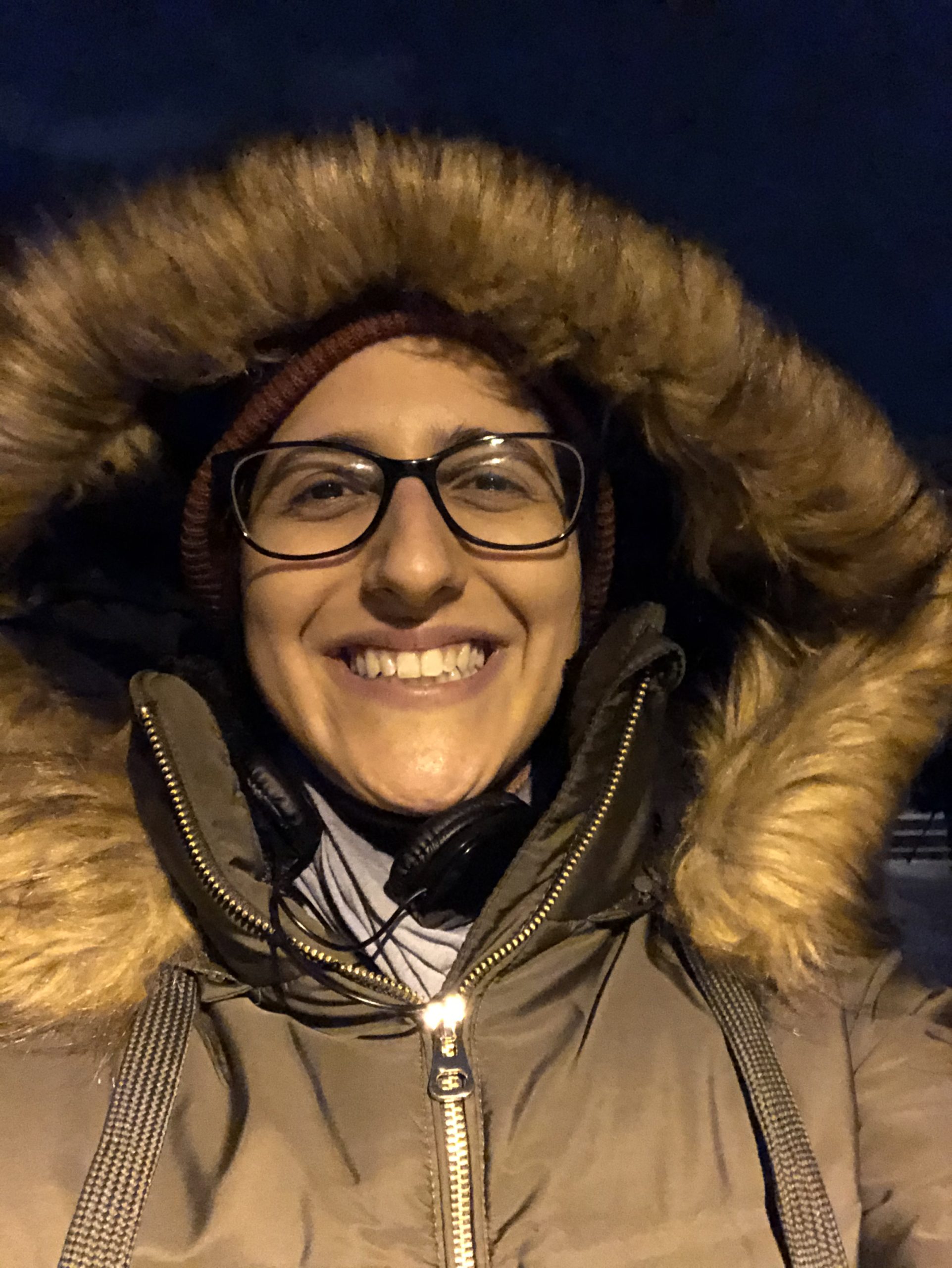
That’s what she did when she landed her first gig in September 2013, just four months after graduation from USC, at Sentient Entertainment, a boutique management company.
“I ended up becoming an assistant, so this way I could pay for everything myself, cut my teeth, learn about the business, make relationships, and still live in LA with my boyfriend,” Piña said.
After about 11 months, thanks to the help of a friend, Piña landed a job at CAA, where she worked as a “floater,” or an assistant who covered and helped various desks in the TV Lit Department. Months into her role, the director of Human Resources recommended her for a long-term assignment assisting one of their oldest agents in the company, Bruce Vinokour.
She stayed for a year and a half and was happy, but was hungry to be on a television show. When she looked for other jobs, she struggled to find any open positions.
“My friends on the TV lit floor said ‘just go work for development in TV because if any of their shows get sold, you can go and be staffed on their show or be an assistant,'” Piña said.
Piña landed at Imagine Television, a production company turned studio run by director Ron Howard and producer Brian Grazer. There, she primarily worked as an assistant, reading scripts to discover new talent and content. She also worked on shows like "Arrested Development" and "Empire."
“I loved learning about development, but I didn’t love doing development,” Piña said. “As a writer, development is the antithesis to everything you believe in—because you want to create and do your own work.”
Then, in November 2016, Donald Trump was elected President of the United States.
“It was kind of the biggest watershed moment in my life, when I realized I had taken all these side paths to becoming a writer but never went the straight line,” Piña said.
Piña quit her job at Imagine. She wanted to work on a television show and decided it was time to give it all her effort. And then her boyfriend of six years proposed.
“My husband had proposed to me within a few weeks because he was like, ‘If Donald Trump is going to be president, we don’t know what’s going to happen, so we should get married,'” Piña laughed.
“That was a very romantic way of getting married because we felt like the world was ending.”
Now unemployed, Piña was emailing and reaching out to every person she’d met in Los Angeles in hopes of finding a job in TV—while also planning a DIY wedding. Piña reached deep into her network. She emailed film school friends, professors, mentors, and anyone else she knew with connections to the industry. She got feedback from some who said that she was too “thirsty,” but she kept going.
Her perseverance and determination paid off, and during the three months she was unemployed, she had 16 interviews to be a showrunner’s assistant. Of the 16, she was offered three jobs.
“I declined the first one because I found out the showrunner was probably a racist,” Piña said. “The second show didn’t look like it was going to make it past another season. And the job I really wanted was to work for Courtney Kemp on 'Power.'”
Piña had submitted her resume to Kemp through a friend who also happened to be Kemp’s agent’s former assistant at CAA. Between the CAA stamp of approval and the writing sample Piña submitted to Kemp, she was hired.
She became Kemp’s assistant in May of 2017.

“2018 was the first year of my life where I didn’t sleep,” Piña said.
Wedding planning. Working as an assistant on Power. Writing pilots and specs.
Not to mention applying to the CBS writing program, an eight-month commitment where diverse, aspiring screenwriters are mentored by executives and coached to help improve their craft, develop relationships, and ultimately break into the industry and succeed. But it’s a competitive program, and to get in, Piña needed to be great and submit her best original work.
She was focused, but often found it challenging to balance her day job as Courtney Kemp’s showrunner’s assistant.
“Every day, there’s like 60 new problems,” Piña said.
Piña was Kemp’s right-hand woman. She helped manage her calendar and schedule—the first line of defense for everyone and anyone who needed Kemp’s input.
“Being a showrunner’s assistant is like constantly trying to herd sheep,” Piña said.
“It’s demanding and challenging because you’re thinking on your feet, constantly solving problems.”
Through the chaos, she found time to submit to the CBS program. Piña landed a spot, and ultimately, it changed her life. Her work was sent to showrunners on various CBS and CW shows, including her favorite since she was a child, "Charmed."
That meeting. The one she arrived hours early for, only to have the button on her dress snap.
“I came into the meeting and said, ‘This show is perfect for me! I used to be a witch,” Piña laughed.
“Actually ... I still want to be a witch!”
Piña wasn’t playing. She had prepared for weeks. She called staff members who worked on season one of the show to dish information she could use in the interview. Piña researched the showrunners inside out and figured out her selling points, or ‘nuggets’ as she calls them, as a person and a writer. For Piña, this included her time as a witch, her experience with Santeria, and her time working on "Power."
“You only have one shot, as Eminem would say,” Piña said. “I never fly in blind.”
Two hours later, Piña was offered the job. The button mishap tried, but couldn’t, kill her vibe.
“I was thrilled,” she said. “But I was so numb at the same time because it didn’t feel real.”
And by no shock, it came full circle with Piña’s ritualistic practices.
“I still had an LSAT book on my shelf in case being a writer didn’t work out, and I decided to still become a lawyer,” Piña said.
“When I got my first writing job on "Charmed" ... I burned it.”

Pińa can’t help but laugh.
“This is dumb, but when I put that I am a staff writer on my LinkedIn and Facebook? That’s when it felt real,” she said.
On May 7, 2019, Piña officially started in the "Charmed" writer’s room. Around the same time, she found representation with Mike Vanderhei, a manager with Rain Management, and about a month after that, she signed with Manal Hammad, an agent at Verve Talent and Literary Agency. She has her own office and parking space—she finally enjoys going to work. Her days can be excruciatingly long, but they’re “thrilling.” Especially so when she started co-writing her first episode of television, about six months after she started in the room.
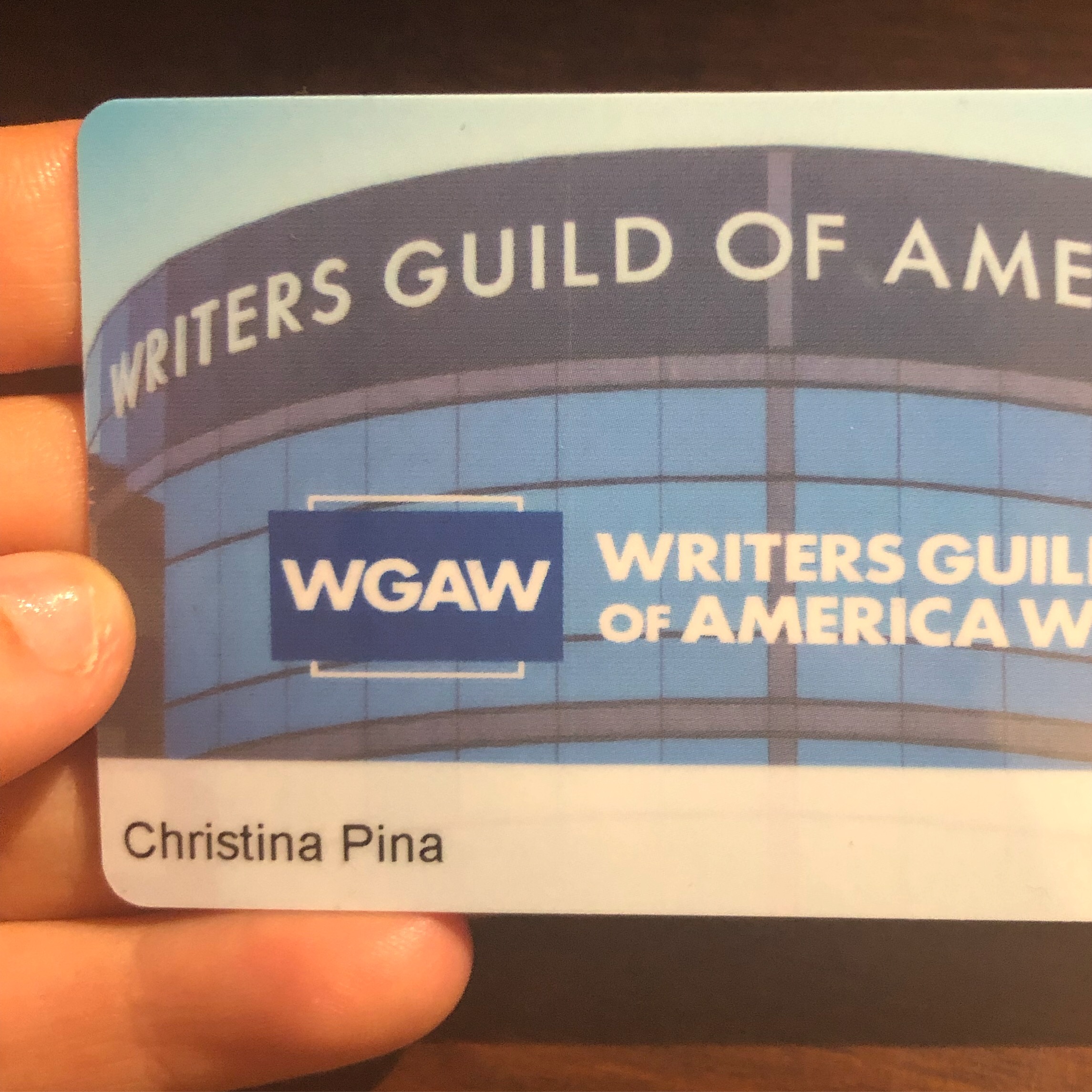
“It was like losing your virginity again,” Piña said. “You have no idea what you’re doing. Arms and legs are flying everywhere. Your brain is a mess, and there are so many thoughts running a mile a minute.”
Piña was paired with an experienced co-writer to write episode 11 of "Charmed"'s second season. They broke the story, spent several weeks writing, and eventually showed their first draft to their showrunners.
“When you get the draft to the showrunner, that’s when a lot of stuff changes the most,” Piña explained.
“Your showrunner hasn’t seen the pages yet, and they’re trying to translate it to production in their head.”
Piña and her co-writer received notes from the showrunners and the network. Eventually, the script gets to the prep stage and then production. Less than a month later, they started writing their next episode.
Trial by fire was how Piña experienced producing her second episode of TV. The script was finished, and the team would be flying to Canada in late February for prep and production. She had orders to meet one of the executive producers there on a specific date. But then, on February 28, she got a frantic call from her showrunner: Piña would be flying solo.
With no real experience to draw from, she produced her episode ...
And then COVID-19 derailed everything. They were forced to shut down. Production was canceled. Piña’s episode, episode 19, became the finale, and when Piña got back to Los Angeles, she was promoted to story editor.
As Piña waits for Hollywood to reopen and for the "Charmed" writers’ room to begin again, she is spending time working on her own projects. Her ultimate goal is to be a showrunner for a show on cable or streaming services while building a Shonda Rhymes-esque brand. She wants to produce content for Latin women and women of color. She hopes to bring more inclusivity into an industry that is still predominantly white and male.
“I only wanted to be a storyteller my whole life because of human complexity,” Piña said.
“When you see someone you don’t know, who is very different than you, and you go through a universal experience, you can then open your mind and your heart to that person and the world that they live in.”
Follow Christina on: Twitter